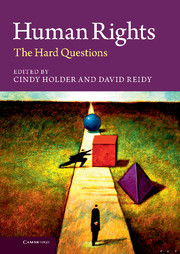Book contents
- Frontmatter
- Contents
- Figure
- List of table
- Notes on contributors
- Introduction
- Part I What are human rights?
- Part II How do human rights relate to group rights and culture?
- Part III What do human rights require of the global economy?
- Part IV How do human rights relate to environmental policy?
- Part V Is there a human right to democracy?
- Part VI What are the limits of rights enforcement?
- 17 Is it ever reasonable for one state to invade another for humanitarian reasons?
- 18 Conflicting responsibilities to protect human rights
- 19 Searching for the hard questions about women’s human rights
- 20 Are human rights possible after conflict?
- Part VII Are human rights progressive?
- Index
- References
19 - Searching for the hard questions about women’s human rights
Published online by Cambridge University Press: 05 May 2013
- Frontmatter
- Contents
- Figure
- List of table
- Notes on contributors
- Introduction
- Part I What are human rights?
- Part II How do human rights relate to group rights and culture?
- Part III What do human rights require of the global economy?
- Part IV How do human rights relate to environmental policy?
- Part V Is there a human right to democracy?
- Part VI What are the limits of rights enforcement?
- 17 Is it ever reasonable for one state to invade another for humanitarian reasons?
- 18 Conflicting responsibilities to protect human rights
- 19 Searching for the hard questions about women’s human rights
- 20 Are human rights possible after conflict?
- Part VII Are human rights progressive?
- Index
- References
Summary
The problem comes in knowing which unanswerable questions to ask. (Haraway 1992, 316)
Introduction
Transitional times appear to offer hope for real change. They invoke a sense of movement and space that might be effectively exploited to slot into place gender demands traditionally thwarted by a range of political, cultural and institutional obstacles. In recent times the plethora of societies and nations in transition from conflict to post-conflict, from authoritarian regimes to democratic ones, from colonial authority to sovereignty, from under-developed to developing/developed have presented numerous chances to intervene. Rwanda, Afghanistan, Iraq, Timor Leste and, more recently, the “Arab Spring,” are just a few of the places that have emerged on the international media-scape in this regard. In the contemporary globalized political environment dominated by neoliberal foreign policy agendas with accompanying “good intentions” (Žižek 2009), the spaces of political transition transpire as full of opportunities to activate neoliberalism’s devout sense of authority and agency. What is the place of women’s human rights in this grandiose international picture?
Under the pseudonym of Olympe de Gouges, Marie Gouze wrote prolifically (plays, works of prose and political pamphlets) on women’s rights and the abolition of slavery. Owing to their disobedient content and force, these writings earned her another pseudonym, that of “woman-man” – an “unnatural” being (Hunt 2007, 171). Here is a comment from a contemporary of hers, French politician Pierre Chaumette:
Never forget that virago, that woman-man, the impudent Olympe de Gouges, who abandoned the cares of her household to get involved in politics and commit crimes. She died on the guillotine for having forgotten the virtues that suit her sex.
(Quoted in Beckstrand 2002; Hunt 2007, 171)- Type
- Chapter
- Information
- Human RightsThe Hard Questions, pp. 362 - 381Publisher: Cambridge University PressPrint publication year: 2013



